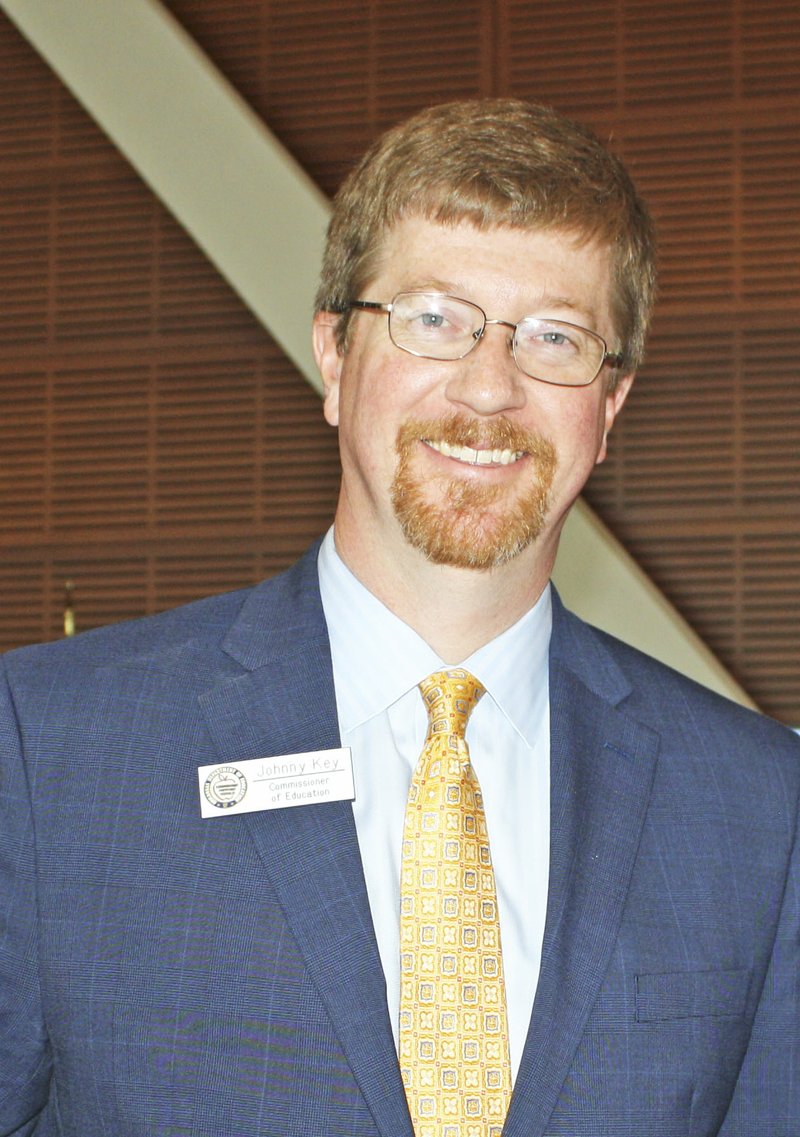FAYETTEVILLE -- The Arkansas commissioner of education said Friday he wants input from parents, teachers, professors, business leaders and community members on how the state should measure schools.
Johnny Key wants to know what people think are the most important characteristics of schools, what the best measures of success and quality for schools are and what it takes for every student to succeed, he said.
Johnny Key
• Recommended for commissioner of education by Gov. Asa Hutchinson and approved by the State Board of Education on March 25, 2015
• Was hired in August 2014 as associate vice president for university relations at the University of Arkansas System
• Past owner of a child care business in Mountain Home
• Baxter County justice of the peace from 1997-2002
• Served six years in the state House of Representatives, beginning in 2003
• Began term in the state Senate in 2009
• Earned a bachelor’s degree in chemical engineering in 1991 from the University of Arkansas
Source: Arkansas Department of Education
"What should we be measuring as part of our state accountability system? Help us create it," Key said. "We don't have a plan written because we are serious about getting feedback."
Key was the featured speaker Friday for a fall lecture series for the Department of Education Reform at University of Arkansas. He shared with the classroom full of educators and students how the state Education Department began a little more than a year ago to establish a new vision: transforming Arkansas to lead the nation in student-focused education.
Federal lawmakers about that same time were debating proposals for replacing the No Child Left Behind Act of 2001.
Key was surprised when Congress passed legislation to revise the federal education law with the Every Student Succeeds Act of 2015. The U.S. Department of Education is establishing the regulations for implementing the law. It will require the state to develop a comprehensive accountability system for schools.
State education officials are seeking input in defining what that means and how the system should work, Key said. He wants the system to provide enough flexibility for school districts to respond to changes in their communities and to try different approaches for learning.
A recent visit to Prescott gave Key the opportunity to see a class that blends social studies and English. He heard a student suggest the election of a class president. The teacher used that moment for a learning opportunity and asked the student to write about why the class should elect a class president, Key said.
While many schools still have students sitting in rows with a teacher at the front, some districts in different parts of the state are shifting to a learning environment where students work in groups and activities blend multiple subjects, Key said.
"It is our vision we move more to this type of integrated learning," he said.
What Key described sounds like an ambition vision for what schools could look like, but the commissioner also was aware of the hard work educators and district leaders do, said Elise Swanson, a former Pine Bluff High School teacher who is in her second year of pursuing a doctorate in education policy at the university.
Swanson liked the idea of schools and communities playing a role in shaping education to meet the needs of students, she said.
Key wants communities to have a greater connection to schools, he said. Education isn't limited to the school day, and community involvement goes beyond Friday night football games, he said.
He also wants the department to shift its focus from ensuring schools comply with state and federal regulations to supporting schools in meeting those regulations, Key said.
The commissioner's ideas were broad, but signaled a willingness to try different approaches, said Gary Ritter, endowed chair in education policy in the Department of Education Reform. Previous education commissioners have come to the department with a background in school systems and connections with traditional education groups.
Ritter thinks the state's plans for schools should focus on outcomes and should promote recruiting and retaining quality teachers, he said. High quality teachers aren't necessarily those with master's degrees or those with the most experience, he said.
Key brings a fresh set of eyes to the department, Ritter said. He isn't a former school superintendent, but was a former state legislator who was chairman of the Senate Education Committee. He had experience with owning a child care business and from a brief stint in administration with the University of Arkansas System.
"He's willing to make changes," Ritter said.
NW News on 10/08/2016
